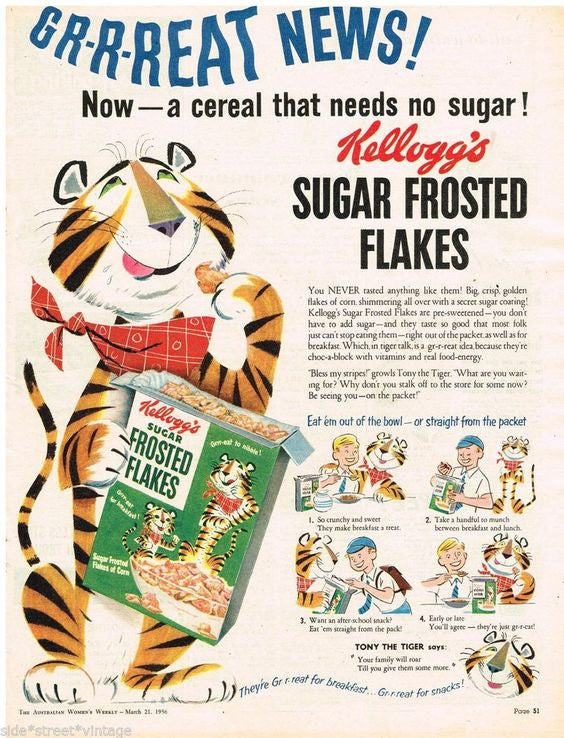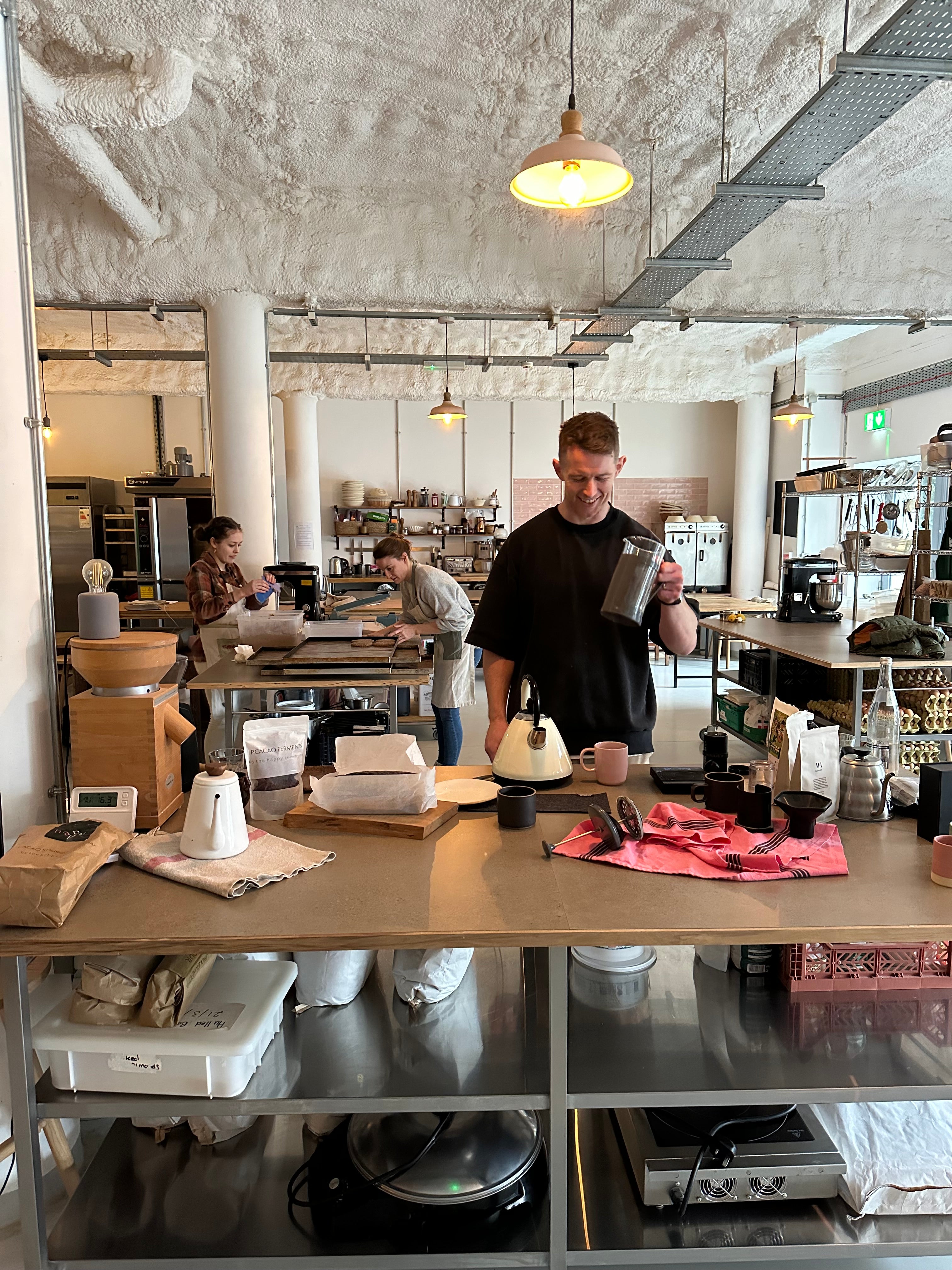In a time when the average British person is only eating half their RDA (recommended daily allowance) of fibre, I reflect on some of the food marketing that got us to this place.
Mr. John Kellogg - the man who notoriously created breakfast cereals to prevent masturbation believed a diet of bland cornflakes and vegetarianism would prevent sexual activity. Though the motivation behind the Kelloggs' brand completely shocked me first time I discovered it, the man behind the brand began to rather amaze me.
In the late 1800's when people began moving away from a large farmer's breakfast to lighter options due to a new era of industrialisation and now being sat at a desk for hours, cereals instigated a new healthier eating fad. A fad that engrained itself in society not only due to the practical need of something lighter before little physical activity, but due to society's belief in its religious founders and what they promoted - largely encouraging hard work. To work hard you needed a cereal to keep you going in the morning. People were told if they ate lighter and healthier they would be more efficient at work. Hard work was greatly respected. And so too became the product which enabled you to work hard.
This religious man, John Kellogg created a lifestyle brand that forbid alcohol and meat, encouraged exercise, vegetarianism and eating cereal for breakfast every morning. Eating cornflakes (toasted corn flakes as they were known back then) became a real part of American culture in the 19th century. Marketing genius you could say.
But trouble arose!
It was in 1878 that John Kellogg invented Cornflakes. In 1897 John Kellogg with his brother Will Kellogg started the Sanitas Food Company to produce their wholegrain cereals, a time when breakfast for the wealthy was eggs and meat while the poor ate porridge and other boiled grains. Eight years into their business relationship together Will argued with John over the recipe for the cereals. Will wanted to add sugar to the flakes. So, in 1906, Will started his own company, the Battle Creek Toasted Corn Flake Company, which eventually became the Kellogg Company, triggering a decades-long feud. John then formed the Battle Creek Food Company to develop and market soy products.
How interesting it is to see (in their religious endeavours) the Kelloggs' brothers feud over the direction of the company and see the initial motivation behind the brand "to make a healthy, bland cereal to prevent masturbation" extracted from the equation so early on. Was it sugar that built a brand that has celebrated so much growth for more than a century?
What an incredible example of power and how one man's decision to sugar cereal, a product which millions of people were then eating for breakfast each morning instead of porridge could ruin the benefits and reputation of a grain overnight!
Though obsessed by preventing masturbation John Kellogg had a much better handle on the nutritional impact of what we eat.
J. Kellogg was an especially strong proponent of nuts, which he believed would save mankind in the face of decreasing food supplies. Though mainly renowned nowadays for his development of corn flakes, Kellogg also patented a process for making peanut butter and invented healthy "granose biscuits."
Kellogg believed that most disease is alleviated by a change in intestinal flora; that bacteria in the intestines can either help or hinder the body; that the intestinal flora is changed by diet and is generally changed for the better by a well-balanced vegetarian diet favouring low-protein, laxative and high-fibre foods; and that this natural change in flora could be sped by enemas seeded with favourable bacteria, or by various regimens of specific foods designed to heal specific ailments.
Though an extremist in his views around sexuality John Kellogg was on the money in terms of gut health back in 1900. It is certainly interesting to day-dream about what may have happened to breakfast if it weren't for his brother Will bringing sugar to the breakfast table and creating a need for grains to taste sweet to be edible.
And here we are in present day with millions of products on shelves across the world labelling themselves as sugar free yet the main ingredient is date syrup or maple syrup or any other kind of syrup because that's not "real sugar". Sweet flavourings around the world masking "bland" food.
Ah....marketing. How healthier we might all be without you!
But fortunately we are now living in a time of great science and technological advancements. We have a better understanding of how we should eat. Yet that education is still not reaching the masses and where it is, accessible products labelled as "healthy" are still do damn attractive because they're either owned by someone you want to look like or instagram'd by someone you want to look like or they're cheaper than making food yourself. And this, the greatest problem of all - how after years and years of the food industry making ready meals and snacks so accessible and cheap do we learn new behaviours? How do we reshape our taste-buds? How do we start questioning lifestyle choices as opposed to first believing?
Pre industrialisation we were doing ok. We were all eating a lot more fibre, we had about 3 bowel movements a day and we were eating lots of delicious fermented foods - in particular some delicious wholegrain sourdoughs.
Present day nothing has changed in terms of how quickly we like to believe in someone - in someone showing us how to live. Drink juice, have this energy ball (obvs it's better than an apple!), eat these brownies laced in date syrup, drink almond milk lattes (so much better than a regular black coffee or a glass of water obvs), don't drink alcohol, your body is your temple etc etc etc..
Sounds like a lot of hard work doesn't it? Remind you of someone?
A good sales person is very good at on-boarding people, promoting a way of life and product. But when the science is what it is why do we now live in a time of increased knowledge yet unhealthy products still get the "healthy" marketing campaign? Because food has become one of the most commoditised substances of our time. Unless you work in food it's unlikely you will think about the journey from the planting of the food you eat to its packaging to its delivery across the world to where you live. You won't think about the number of people, stages, elements involved in making that food accessible to your tummy because food is a basic right and should be cheap right? But it shouldn't. Good food is expensive to produce. Not eating locally and in season is expensive. If you want your tummy, your good gut bacteria to be feeding off the best diet you need to be preparing your own food from whole foods or buying from bakers, producers, restaurants making nourishing food from scratch using processes like fermentation beneficial to the gut.
Though I don't share the Kellogg's view on masturbation I do agree with how strongly Mr John Kellogg believed food can effect us. Before Will his brother took over the Kellogg brand and began making Frosties and steering a marketing campaign that seemed to promote one's aesthetic as opposed to one's gut feeling Kellogg tried to educate people around eating to feed one's good gut bacteria.
More than 100 years on this is finally becoming fashionable! Feed your gut bacteria what it wants yo. It wants fibre.


